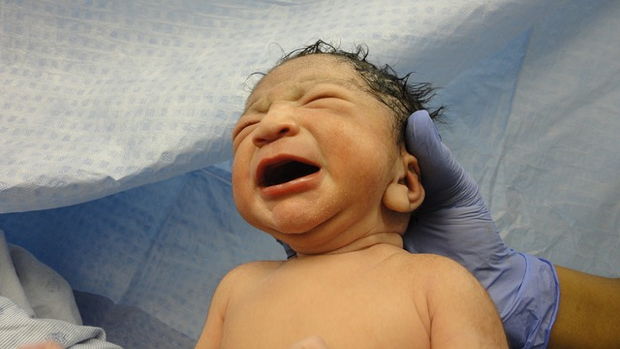
When they told me that I’d have to push soon, I asked for an epidural. I was exhausted, overwhelmed, and the thought of pushing made the pain of labor that I was already feeling unbearable. Also, I’m a wimp.
So I got an epidural. And the relief I felt was immediate and miraculous and it renewed my faith in God and humanity. My primary care doctor, who had canceled a ski trip to be with us for the birth, further renewing my faith in God and humanity, told me to try to sleep. And I did what she said. I slept through the worst of my contractions.
As my body was working to bring new life into the world, I slept. It was surreal.
When it was time to actually push, the moment became even more surreal because the women with me had to tell me when to push and how because I couldn’t feel the pain that would naturally tell me to do what I needed to do.
In my state of epidural bliss, my body labored, but my mind wandered.
I remember thinking how strange it was to escape the pain of labor — it felt like cheating.
Exhausted and feeling an urgent and deep love for an anesthesiologist whose face and name I can’t quite recall, I remember thinking, honest to goodness, about how my privilege is like that epidural, numbing me to the pain of others.
In a particularly ironic moment, the numbness produced by that epidural caused me to feel my privilege in a way I’d never felt it before. Never had it been so clear to me that, when it comes to issues of justice and the suffering of others, I need to be told when and how to push because I don’t feel the pain that would cause me to respond as I should.
My epidural eventually wore off, but the numbness didn’t. It never does. And that is my privilege.
As Christmas approaches — when “unto us a child is born and unto us a son is given” — I am reminded of my numbness. And it strikes me that to receive that child well, to actually respond as we ought, we, the privileged, need to turn down the epidural.
From our perspective, warm and safe, rich and free, we approach the manger with glee and wrapping paper, with a cocktail in hand and thanksgiving. Numbed by our distance from and unfamiliarity with the suffering of others, we go through this holiday as blissfully naïve revelers. For us, Christmas is a time of light-hearted celebration.
“All is calm, all is bright” goes the old chorus. And I can tell you that if you’re privileged enough, you sing it loudly, naïvely believing it’s true, never stopping to consider that for far too many people, even on Christmas, the world isn’t calm and it isn’t remotely bright.
And this comfortable naïveté is an old problem among Christians. Nearly five hundred years ago, Martin Luther raised a question that should haunt those of us who live in comfort.
“If Christ had done what you are doing, who would ever have been spared?”
Because Christ did not come seeking comfort. He did not come wielding privilege.
Instead, on that first Christmas, in a most scandalous way, God stepped down from on high to inhabit the darkness of a womb and then the darkness of the world. He didn’t go to the rich and powerful; he didn’t come as one who was rich and powerful. He came in the flesh, naked and needy. He depended on the poor to feed him, the homeless to house him.
On Christmas God stepped down from all privilege and power, and became the most vulnerable — a brown-skinned baby, born to homeless parents forced to flee for their lives from a violent regime.
Divested of power, and in humility and poverty, God came down; to lift up the lowly and to set the prisoners free by quite literally taking up their pain and bearing their suffering. God responded to a world in pain by entering it, laboring as one of us, among us, to save us.
It’s a story that so clearly begs a response. And maybe this year light-hearted revelry isn’t enough.
For while people like me get a holiday with a little more joy, time with family and friends, and the self-satisfaction that comes with a few extra acts of generosity, refugees are still running for their lives, a brown-skinned baby is still more vulnerable than any other, and the poor are still just as poor.
Perhaps this Christmas we who are privileged might reflect on this: God became like us, but how much like God have we become?
How willing are we to follow Jesus’s example and step out of our comfort and privilege, entering into this world’s pain so that we might know better when and how to push for justice, for mercy, for truth?
Or are we content to remain numb, to simply enjoy the comfort that our privilege affords us?
I know that I cannot divest myself of all privilege. I can’t change the color of my skin any more than I can physically become a baby. But I can labor differently in this world.
I can stop wimping out in the face of injustice.
I can listen more attentively to the wise and prophetic voices telling me of the injustice in the world.
I can empathize more deeply with the suffering of others — my neighbor, my friend, the stranger, the foreigner.
I can and I should push harder for more justice and peace and truth to come into this world.
I can give up some of my comfort so that others might be lifted up.
And for us who are privileged, this, more than naïve reveling seems the response that Christmas begs: that we might look into the manger and humble ourselves likewise.